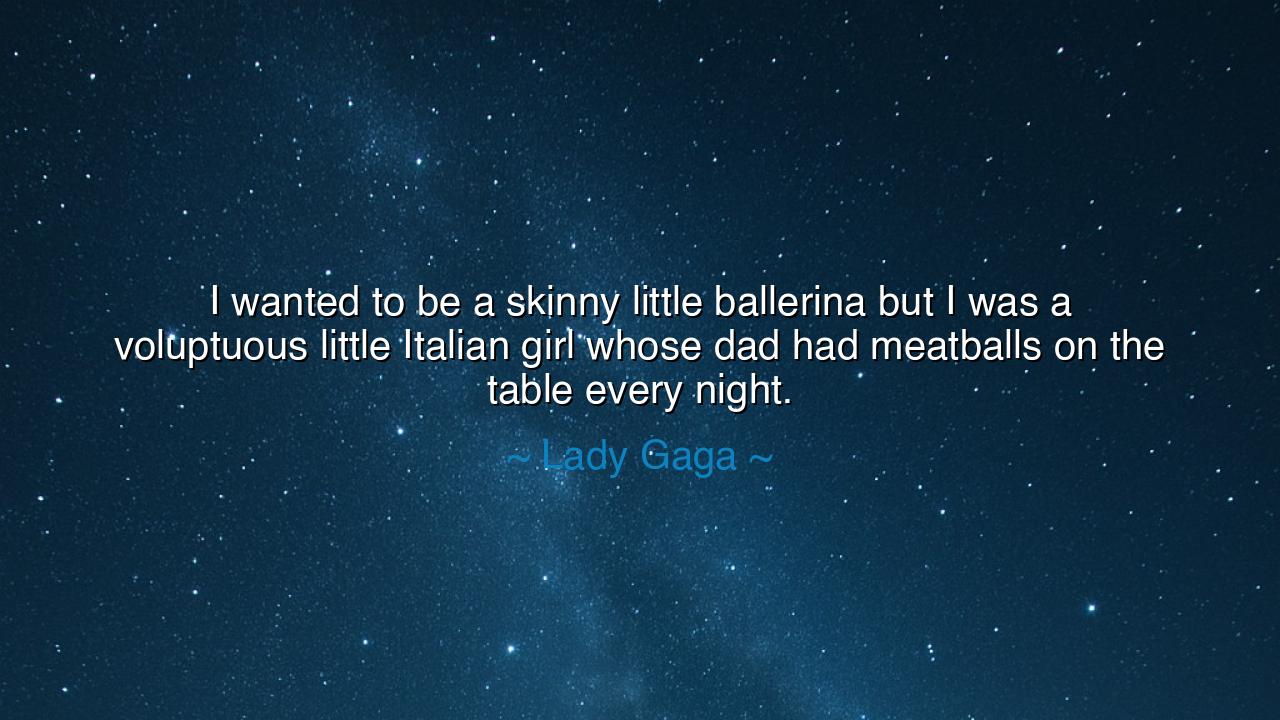
I wanted to be a skinny little ballerina but I was a voluptuous
I wanted to be a skinny little ballerina but I was a voluptuous little Italian girl whose dad had meatballs on the table every night.






"I wanted to be a skinny little ballerina but I was a voluptuous little Italian girl whose dad had meatballs on the table every night." Thus spoke Lady Gaga, the modern muse of defiance and self-creation, whose words carry both laughter and lament. In this confession, we hear the eternal struggle between who we dream to be and who we are born to be. Beneath the humor lies the ache of self-acceptance — the yearning of a soul that sought grace and perfection, yet was shaped by flesh, family, and heritage. Her words are not merely about body and beauty; they are about identity, and the hard-won peace between the self we imagine and the self that life gives us.
In this quote, Gaga paints a vivid contrast: the fragile, weightless ballerina of her dreams, and the warm, earthly reality of her childhood home — a place filled with food, family, and love. The ballerina is an image of control, discipline, and elegance; the Italian girl, of passion, abundance, and appetite. One belongs to the realm of artifice and ideals; the other to the realm of humanity and heart. Gaga’s journey — like that of so many — began in the tension between these two worlds. She wanted to float like the ballerina, yet life rooted her in earth and blood and bread. Her father’s meatballs on the table every night became more than food; they became the symbol of culture, belonging, and love — the very things that fed her creativity even as she longed to escape them.
The ancients would have understood this conflict well. The Greeks spoke of the duality of being — Apollo and Dionysus, discipline and passion, restraint and expression. The young Gaga, dreaming of thinness and control, reached for the Apollonian ideal — the world of form and balance. But the voluptuous little Italian girl within her belonged to Dionysus — the god of music, emotion, and excess. In time, she would learn that greatness lies not in denying one for the other, but in marrying them. Her art, her music, her performance — all would emerge from this sacred union of contradiction.
Her struggle is the story of every artist, every human soul that has ever looked into the mirror and felt the sting of imperfection. To be born into a body, a culture, or a circumstance that differs from one’s dream is not tragedy — it is material. The sculptor needs marble that resists his chisel; the poet needs pain that demands to be spoken. Gaga’s “meatballs on the table” are not an obstacle to her art — they are its origin. From the warmth of her father’s home came the fire of her individuality; from her self-consciousness grew her rebellion; from her rebellion, her authenticity.
Consider the story of Frida Kahlo, who also longed to embody grace and beauty but was bound by a body broken by accident and pain. She could not dance or run — but she painted her agony into color, her limitation into liberation. So too with Gaga: what she once saw as a flaw became her power. She learned that beauty is not conformity, but truth. Her very difference — her body, her heritage, her voice — became the foundation of her art. And thus, she did not become a ballerina of the stage; she became a dancer of the soul, moving millions with her courage to be fully herself.
Her words remind us, too, of the quiet strength of family — the father who fed her, who grounded her even as she dreamed of flight. The “meatballs” symbolize the simple, sustaining love of one’s origins. In youth, we often resist where we come from, thinking greatness demands escape. Yet as Gaga’s life shows, true greatness arises when we embrace our roots, transforming them into art. What once seemed ordinary — the warmth of a home, the rhythm of a family meal — becomes sacred when viewed through the eyes of gratitude and growth.
So, my child, take this lesson from Lady Gaga’s words: do not despise your beginnings, nor the parts of yourself that feel imperfect. The world may tell you to fit its mold — to be smaller, quieter, more graceful, more acceptable. Resist this lie. The soil of your identity — your body, your family, your story — is the very ground from which your greatness will rise. Do not wish to be the ballerina who floats above the earth; be the creator who dances upon it, unashamed of her roots, radiant in her truth.
For in the end, the world does not remember the perfect, but the authentic. It is not the ballerina’s frailty that endures, but the artist’s fire — the woman who turned her difference into art, her laughter into strength, her heritage into song. Like Lady Gaga, learn to feast on your life — to take the meatballs and the melody, the tears and the triumph — and make of them something divine.






AAdministratorAdministrator
Welcome, honored guests. Please leave a comment, we will respond soon